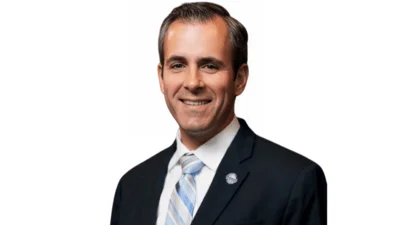Illinois State House Rep. Dan Ugaste (R-Geneva) has represented the 65th district since January 2019. | repugaste.com
Illinois State House Rep. Dan Ugaste (R-Geneva) has represented the 65th district since January 2019. | repugaste.com
Illinois's now-passed — and challenged — partisan redistricting is designed to keep Democrats in power, and if Illinoisans don't like it, they should say so, a Chicagoland state representative said during a recent interview.
If Illinoisans keep quiet about what he calls unfair maps, then they can expect the same old, same old, State House Rep. Dan Ugaste (R-Geneva) told the Kane County Reporter.
"Under one party rule, reforms to change an election system that endanger the continuation of one party rule are doomed to failure," Ugaste said. "Democrats will always kill any referendum or legislation that would create a nonpartisan, fair and impartial drawing of legislative districts. The only hope is for residents to rise up and vote for those other than currently in office. Then they should get the opportunity to approve a statewide referendum to eliminate partisan primaries and allow all candidates to run at-large within their districts in a nonpartisan general election under a Ranked Choice Vote system."
Pritzker signed off on unfair maps earlier this month despite a campaign promise not to do so, Ugaste said.
"Pritzker broke a promise to all Illinois citizens that the 2021 redistricting product ... would be a fair and impartial map generated through a cooperative and transparent process," Ugaste said. "None of those goals were even remotely attempted, let alone achieved. The Republican leadership refused to be an accessory to these actions and have challenged the Democrat map in Federal court."
Ugaste has represented Illinois' 65th House District since January 2019, after defeating Democrat challenger Richard Johnson and taking 52% of the vote to take of the seat formerly held by Rep. Steve Andersson, who did not seek a second term. This past November, he was elected to a full term, defeating Democrat challenger Martha Paschke and taking more than 51% of the vote. Ugaste previously was for many years on the Lake Forest College Alumni Board, serving as board president from April 2016 to April 2018.
The 65th House District is within the Chicago metro area and includes Batavia, Elgin, Geneva, St. Charles, Burlington, Dundee, Grafton, Hampshire, Plato and Rutland.
Pritzker has hinted he may not seek re-election, according to a WIFR news report published earlier this month.
In April, well before maps were passed, an NPR Illinois news story said Pritzker was trying "to recast his previous statement" to suggest he doesn't mean now what he said then.
He also blamed the state's Constitution.
"I have also said that in order for us to have an independent commission, we needed to have a constitutional amendment — something that would actually change the way the process operates today in the Constitution," Pritzker said in the NPR news report. "That did not happen."
Pritzker and the state legislature also were up against a Constitutional deadline of June 30, after which an eight-person bipartisan panel would have been created — as required under the state's Constitution — to come up with equitable redistricting.
Instead, Democrat lawmakers in Springfield ran the once-in-a-decade redistricting season, racing to craft new legislative and congressional maps and get Pritzker to sign them into law by June 30, before Democrats could lose an ironclad partisan advantage.
This redistricting year was supposed to be different. Three years ago, Pritzker vowed to veto any "unfair" map. However, NPR Illinois reported that Pritzker and Democratic lawmakers "have melded their definitions of 'fair' and 'unfair' maps," saying instead the maps should reflect the state's diversity.
The majority of Illinoisans what fair maps, according to a University of Illinois Urbana-Champaign professor, and, much earlier in the most recent passed legislative session, it looked like the will of that majority might have a vehicle to get those fair maps.
The bipartisan Senate Bill 1325, also called the People's Independent Maps Act, would have removed politicians from making decisions about redistricting and place that power in the hands of Illinoisans. On Friday, SB 1325 missed a deadline to come up for third reading. Instead, the bill was referred to assignments, where it died.
In addition to a legal challenge filed by leading GOP lawmakers against the maps, set to take effect in 2023, the Mexican American Legal Defense and Educational Fund (MALDEF) filed suit on June 11 against leading Democrat lawmakers and state election officials. The latter legal challenge called the redistricting unconstitutional and "malapportioned," saying it doesn't provide equal representation of all of the state's populations.
"Illinois voters, including the growing Latino voter community, are entitled to districts that accurately reflect the population as determined by the constitutionally mandated decennial census," said MALDEF President and General Counsel Thomas A. Saenz said in a statement issued the same day. "Ultimately, the General Assembly will have to redraw lines for the 2022 elections using the proper decennial census data."
It's no surprise that the unfair maps aren't, well, fair but the courts may not provide a remedy, Ugaste said.
"The maps are designed to empower the Democratic Party above its proportional representation within the general population," Ugaste said. "That is inherently unfair, but political gerrymandering has yet to be struck down by the courts, so this is a political crime that may again go unpunished while our Illinois residents continue to be victimized by policies that are accelerating our state's financial and economic spiral due to-one party Democratic rule. In addition, they are not based on the U.S. Census data collected last year and violate the basic standard of representation of 'one person, one vote.'"
Without a remedy, what ails Illinois will only worsen, Ugaste said.
"Under the Democratic map you will see accelerated growth in the exodus of residents and businesses due to the accelerated growth of debt, taxes, and deficit spending," he said. "Borrowing may end only because no one in their right mind would ever lend money to the State of Illinois in its current condition."






 Alerts Sign-up
Alerts Sign-up